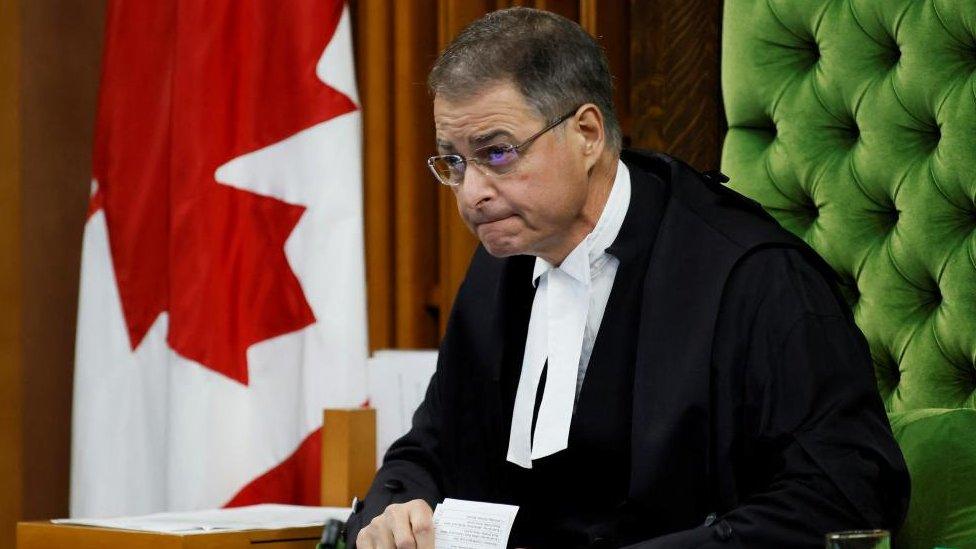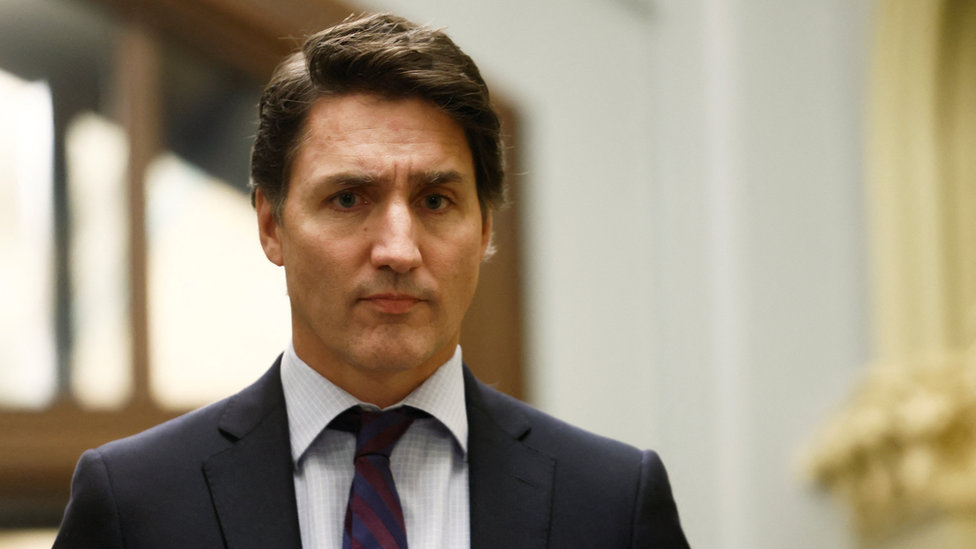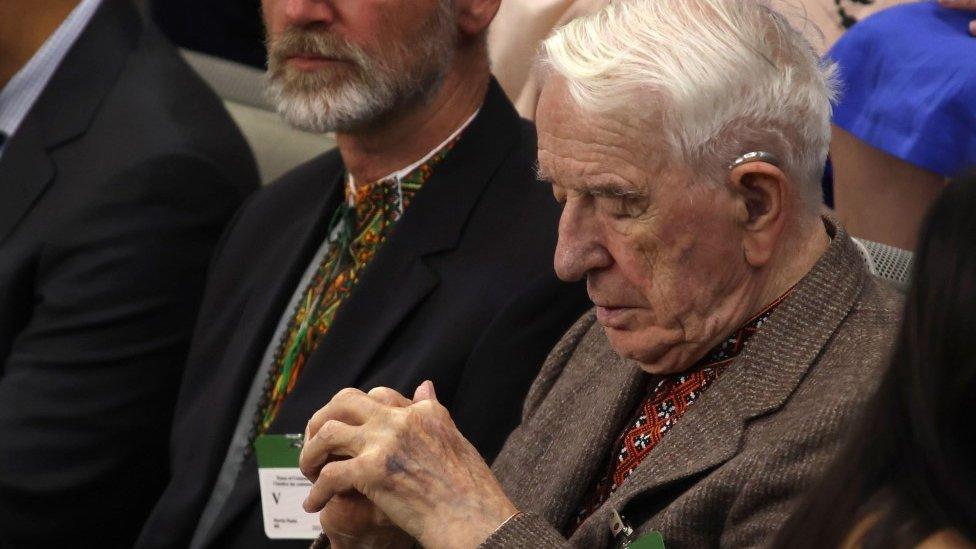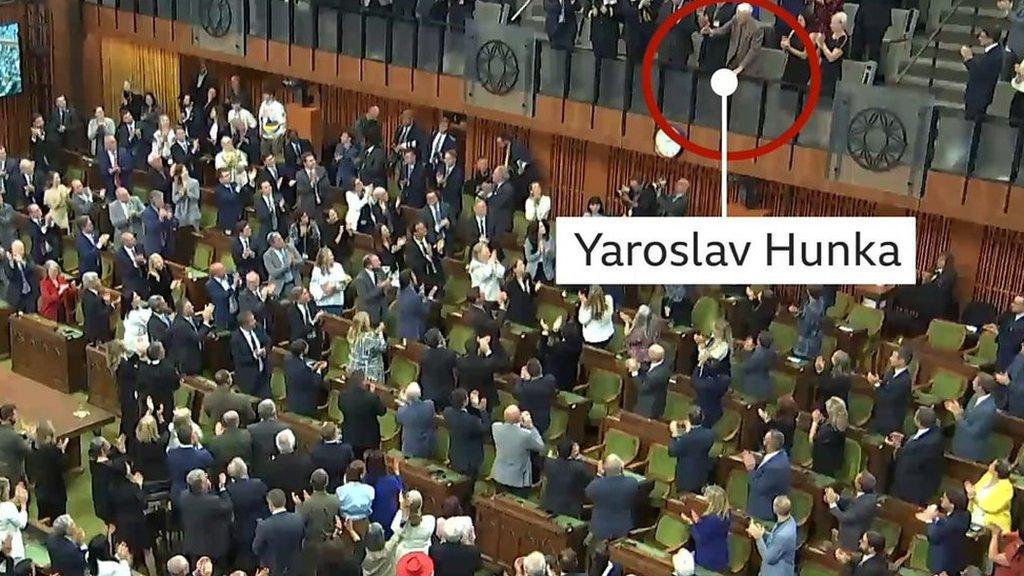Canada's Speaker Anthony Rota resigns after Nazi in parliament row
- Published

Speaker of the House of Commons Anthony Rota said he did not know of the 98-year-old's previous Nazi ties
The Speaker of Canada's House of Commons has resigned after inviting a Ukrainian man who fought for a Nazi unit to parliament and praising him.
After first resisting calls to step down, Anthony Rota quit on Tuesday after meeting party leaders in Ottawa.
"I must step down as your Speaker," he said in parliament. "I reiterate my profound regret."
The incident last Friday drew global condemnation.
Yaroslav Hunka, 98, got a standing ovation after Mr Rota called him a "hero" during a Friday visit by Ukrainian President Volodomyr Zelensky.
Mr Rota has said he did not know of Mr Hunka's Nazi ties and made a mistake in inviting him to attend the event.
Canada's Prime Minister Justin Trudeau said on Monday it was "extremely upsetting that this happened".
"This is something that is deeply embarrassing to the parliament of Canada and by extension to all Canadians," he told reporters.

Mr Trudeau called last week's incident "deeply embarrassing"
During World War Two, Mr Hunka served in the 14th Waffen-SS Grenadier Division, a voluntary unit made up mostly of ethnic Ukrainians under Nazi command.
Division members are accused of killing Polish and Jewish civilians, although the unit has not been found guilty of any war crimes by a tribunal.
Earlier on Tuesday, Poland's Education Minister Przemysław Czarnek said he had "taken steps" towards extraditing Mr Hunka.
Mr Hunka and his family could not be reached for comment by the BBC. They have not yet commented to Canadian media.
Members of Mr Trudeau's cabinet had joined cross-party calls on Tuesday for Mr Rota to step down.
Hours before the Speaker announced his resignation, Foreign Affairs Minister Melanie Joly called the mistake "completely unacceptable".
"I think the Speaker should listen to members of the House and step down," she said. "I don't think there's any alternative."
Watch: The moment Canadian lawmakers celebrate Ukrainian Nazi
House leader for Canada's New Democratic Party Peter Julian applauded Mr Rota's resignation, calling it the "right decision".
"We fully accept Mr Rota's apology and believe that he didn't intend to cause harm but, unfortunately, there are very real consequences to his lapse in judgment," he said in a statement.
Canadian Jewish organisations also welcomed the speaker's decision to step aside.
But Friends of Simon Wiesenthal Center for Holocaust Studies said "questions remain as to how this debacle occurred".
Michael Mostyn, CEO of Jewish human rights group B'nai Brith Canada, told the BBC that the incident "cannot end simply with the speaker".
"We have a situation in Canada, where we don't know our own history when it comes to Nazi perpetrators that made their way into this country," he said. "It's a shame to our country."
Mr Rota's resignation has not slowed criticism from Canada's opposition leader, the Conservative Party's Pierre Poilievre.
Addressing parliament, Mr Poilievre said the responsibility fell to Mr Trudeau "to reverse the massive damage done to our international reputation".
"Will he rise in this place and apologise for this massive and shameful failure?" he said.
With reporting from Nadine Yousif
Related topics
- Published26 September 2023

- Published25 September 2023
